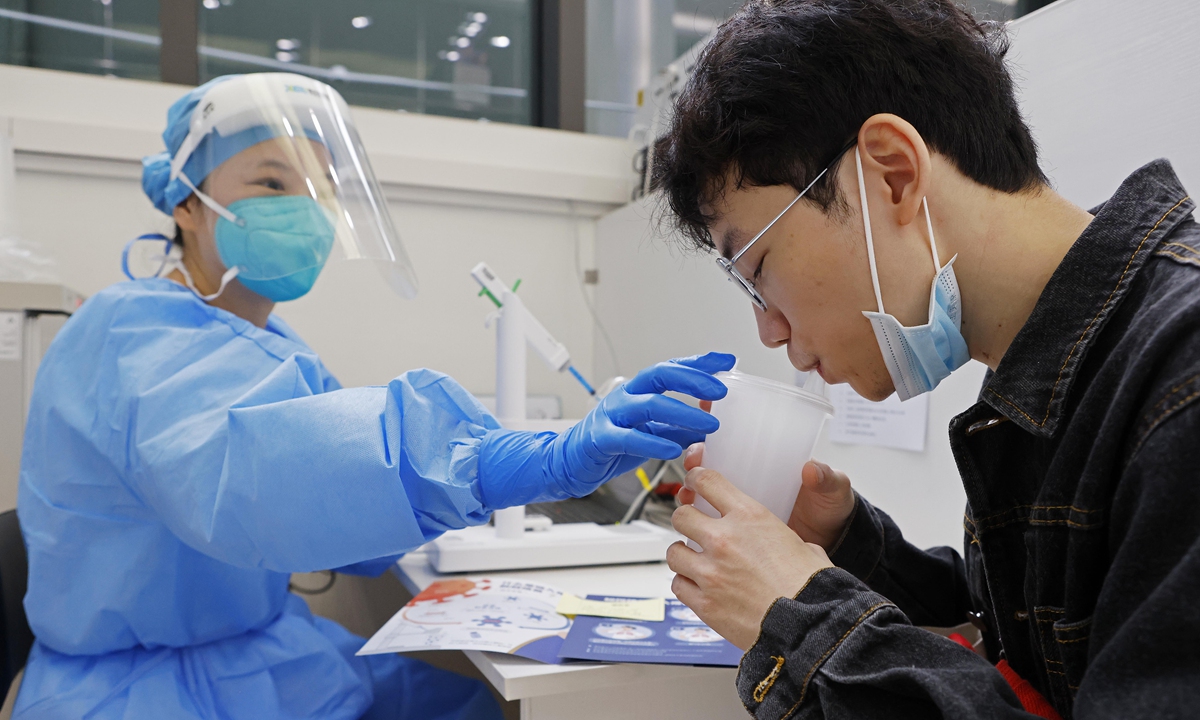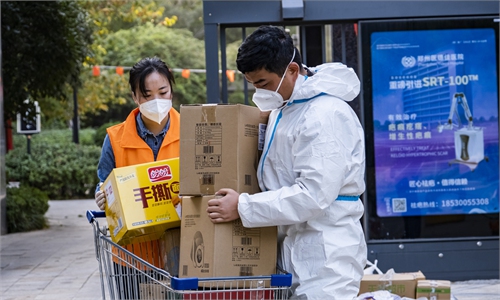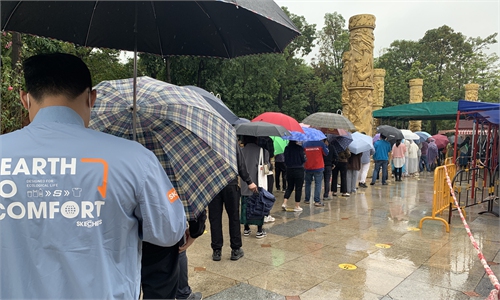China's central leadership calls for optimized COVID response, precise measures amid dynamic-zero policy

A Shanghai resident receives inhaled COVID-19 vaccine as a booster dose on October 26, 2022. Shanghai became the first city in China to provide this type of vaccine boosters. Photo: VCG
The Standing Committee of the Political Bureau of the Communist Party of China (CPC) Central Committee met on Thursday to hear a report on the COVID-19 response, and discussed and arranged 20 measures for further optimizing epidemic prevention and control work.
Xi Jinping, general secretary of the CPC Central Committee, presided over the meeting and delivered an important speech.
The meeting, which reiterated that China will unwaveringly stick to its dynamic zero-COVID policy, also emphasized that key areas should curb the viral infections as soon as possible and restore normal life and production, optimize COVID-19 prevention work and implement more precise measures, and roll out vaccinations, as well as research and development of COVID-19 medicines. It said that anti-COVID-19 measures should not be relaxed, but a "one-size-fits-all" approach and local governments taking excessive policy steps should be avoided.
The mutation of variants and impact of climate will likely propagate the scale of the COVID-19 spread, and China still faces a severe situation in COVID-19 prevention, said the meeting. It called for willpower to be maintained and for COVID-19 work to be rolled out in a scientific manner.
Experts said that this meeting, convened at a juncture when China is facing another wave of COVID-19 flare-up, aims to inject much-needed momentum into the country's COVID-19 battle, but also to put the brakes on some local governments' excessive prevention measures. Sticking to dynamic zero-COVID policy is in line with China's situation, and optimized COVID-19 control measures may follow after this meeting, said epidemiologists.
While China stressed it will stick to its dynamic zero-COVID policy, the meeting also urged the effective coordination between COVID-19 prevention and economic and social development, and called for the impact of COVID-19 on social and economic activities to be minimized.
The meeting said that adapting to the virus' traits of spreading rapidly, early detection, early reporting, early quarantine and early treatment should be implemented to eliminate transmission, so that virus control measures will not be protracted.
It asked local governments to guarantee people's basic needs when dealing with COVID-19 outbreaks, such as access to medical care and help for special groups like the elderly and minors.
"Emphasizing those measures came just in time. As we are not fully prepared [to relax COVID-19 prevention], we need to double down on dynamic zero-COVID policy," Zeng Guang, former chief epidemiologist of China's Centers for Disease Control and Prevention (CDC), told the Global Times.
Echoing Zeng, another epidemiologist, who requested anonymity, also said the rapid spread of coronavirus has bogged down some local governments, which had started to take excessive measures to contain the virus. This meeting is also set to put the brakes on such behavior, said the expert.
China's State Council on Saturday criticized some cities, including Zhengzhou, for taking a one-size-fits-all and cookie-cutter approach against COVID-19, saying the city has misused lockdown to manage the spread of COVID-19.
Taking excessive measures has not only amplified the impact of COVID-19 prevention on people's daily lives, but has also shaken the public's determination to stick to dynamic zero-COVID, warned the anonymous expert.
Zeng pointed out that the meeting also focused on vaccination, especially for vulnerable groups, and medical resources, which are key factors for China to open up. "I think the meeting covered all aspects. The next step is how to implement those measures," said Zeng.
China's capital city Beijing and North China's Tianjin Municipality have started to provide aerosolized adenovirus vector vaccines as booster shots starting Thursday, following some other cities including Shanghai.
Officials from the CDC said last week that 86.35 percent of those aged 60 and above have completed COVID-19 vaccinations, and 180 million people in this group have received booster shots, accounting for 69 percent of this age group.
Zeng said that further optimized measures may follow after this meeting. "China's COVID-19 situation is different from any country in the world, and it must stick to its own route. I believe optimizing COVID-19 prevention suits China's current situation best, and also paves the way for future virus control work."



